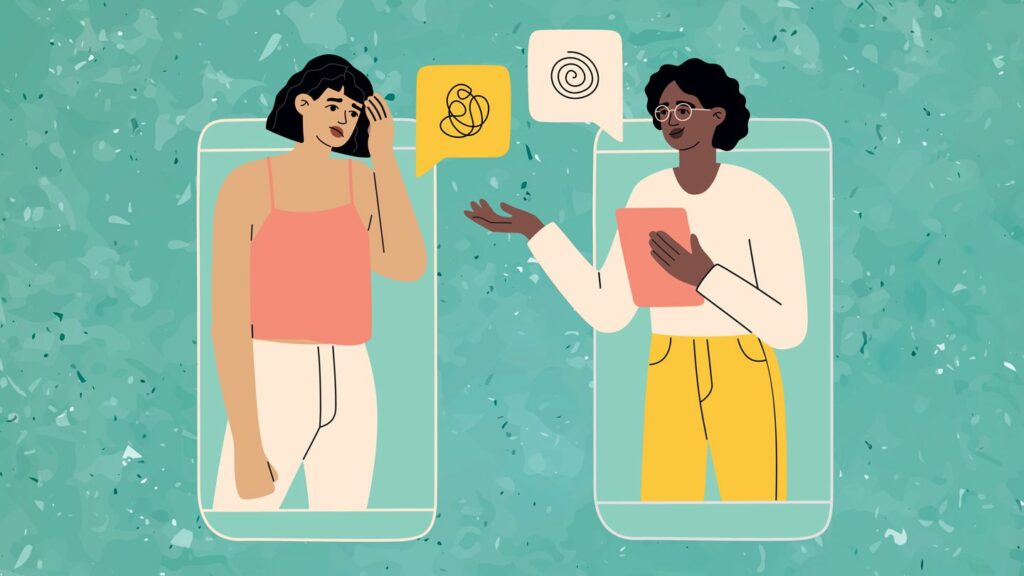Codependency counseling is a form of therapy that helps individuals who have difficulty in their relationships. Codependent people often find themselves in relationships with people who are abusive or addicted to drugs or alcohol. They may also be in relationships with emotionally unavailable people. Codependency counseling can help these individuals learn how to set boundaries and how to take care of themselves. In this article, we will discuss what codependency counseling is, and we will provide a detailed guide on how to find a therapist who specializes in this type of counseling.
Contents
- 1 What Is Codependency Counseling?
- 2 What Are The Goals Of Codependency Counseling?
- 3 What Are The Benefits Of Codependency Counseling?
- 4 What Are The Different Types of Codependency Counseling?
- 5 What Happens In Codependency Counseling?
- 6 Is Codependency Counseling Right For Me?
- 7 Tips To Keep In Mind While Taking Codependency Counseling
- 8 Conclusion
What Is Codependency Counseling?

Co-dependency is defined as “a psychological condition or a relationship in which a person is controlled or manipulated by another who is affected with a pathological condition (as an addiction to alcohol or heroin); co-dependent relationships are usually characterized by an emotional, physical, and/or financial dependence on the other person.”
There are many different types of codependent relationships. Codependency can occur in friendships, family relationships, romantic relationships, and even work relationships. Codependency Counseling is a type of counseling that helps people learn how to break free from these unhealthy patterns of behavior and thought.
What Are The Goals Of Codependency Counseling?
The goal of codependency counseling is to help people learn how to break free from the unhealthy patterns of behavior and thought that are associated with codependency. This type of counseling can help people learn how to develop healthy relationships, set boundaries, and communicate effectively.
Certain goals of codependency counseling may include:
Learning how to set boundaries in relationships
This is one of the most important goals of codependency counseling. Codependent people often have difficulty setting boundaries in their relationships. They may allow others to control them, or they may try to control others. Setting boundaries is an important part of having healthy relationships.
Learning how to communicate effectively
Another goal of codependency counseling is to help people learn how to communicate effectively. Codependent people often have trouble communicating their needs and wants. They may also have trouble expressing their feelings. Learning how to communicate effectively can help codependent people develop healthier relationships.
Learning how to deal with emotions in a healthy way
Many codependent people have difficulty healthily dealing with their emotions. They may bottle up their emotions or suppress them. Or they may try to numb their emotions with alcohol or drugs. Learning how to deal with emotions healthily is an important goal of codependency counseling.
Identifying and changing codependent patterns of thought and behavior
Sometimes codependent patterns of thought and behavior can be so ingrained that people are not even aware of them. Identifying and changing these patterns is another goal of codependency counseling.
What Are The Benefits Of Codependency Counseling?

Codependency counseling can offer many benefits to those who struggle with codependent behaviors and thoughts. Some of the benefits of this type of counseling include:
Improved Communication Skills
One of the main benefits of codependency counseling is that it can help improve communication skills. This is important because codependent people often have difficulty communicating their needs and wants. Sometimes, they may bottle up their emotions or feel like they have to please others all the time.
Counseling can help codependent people learn how to communicate their needs healthily. They will also learn how to listen to others and understand their point of view. This can improve relationships with family, friends, and romantic partners.
Increased Self-Awareness
Another benefit of counseling is that it can help codependent people become more self-aware. This is important because codependents often have difficulty recognizing their own needs and emotions. Counseling can help them become more aware of their thoughts, feelings, and behaviors. This increased self-awareness can help codependents make better choices for themselves and improve their overall well-being.
Increased Self-Esteem
Another benefit of counseling is that it can help codependent people increase their self-esteem. This is important because codependents often have low self-esteem and feel like they are not good enough. Counseling can help them see themselves in a more positive light and realize that they are worthy of love and respect.
Improved Relationship Skills
In addition to improved communication skills, counseling can also help codependent people improve their relationship skills. This is important because codependents often have difficulty maintaining healthy relationships. Counseling can help them learn how to set boundaries, express their needs, and deal with conflict in a healthy way.
If you are struggling with codependency, consider seeking out counseling. It can be an incredibly helpful tool for managing symptoms and improving your overall well-being.
What Are The Different Types of Codependency Counseling?
There are different types of codependency counseling available depending on what best suits the patient’s needs. Some common types of codependency counseling include:
Cognitive Behavioral Therapy (CBT)
CBT is a type of therapy that focuses on changing negative thoughts and behaviors. It can be helpful for codependents who tend to have negative thoughts about themselves or their relationships. CBT can help them learn how to develop more positive thought patterns and beliefs about themselves.
Dialectical Behavior Therapy (DBT)
DBT is a type of therapy that helps people healthily manage their emotions. It can be helpful for codependents who struggle with emotional regulation. DBT teaches skills like mindfulness and distress tolerance which can help codependents become more aware of their emotions and learn how to cope with them healthily.
Family Systems Therapy
Family systems therapy is a type of counseling that focuses on the family unit as a whole. It can be helpful for codependents who come from dysfunctional families or have difficulty relating to others. Family systems therapy can help codependents learn how to develop healthier relationships with their family members.
Existential Therapy
Existential therapy is a type of therapy that focuses on the human experience. It can be helpful for codependents who struggle with finding meaning in their lives. Existential therapy can help codependents find purpose and meaning in their lives, which can improve overall well-being.
No matter what type of codependency counseling you choose, it is important to find a therapist that you feel comfortable with.
What Happens In Codependency Counseling?

During codependency counseling, you will work with a counselor to identify the unhealthy patterns of thought and behavior that are associated with your codependency. You will learn about what healthy relationships look like, and you will be given tools to help you develop healthier ways of thinking and behaving.
Codependency counseling is a process that can help you learn how to break free from the unhealthy patterns of behavior and thoughts that are keeping you stuck in a cycle of codependency. If you are struggling with codependency, consider seeking out counseling to help you improve your well-being.
During the process of codependency counseling, it is not uncommon for patients to feel a range of emotions.
Some common emotions that are felt during codependency counseling include:
Anger is a common emotion that is felt during codependency counseling. This is because codependents often have a lot of pent-up anger that they haven’t dealt with. Counseling can help them learn how to deal with their anger healthily.
Sadness is another common emotion that is felt during codependency counseling. This is because codependents often realize how much they have been missing out on in their lives. They may feel sad about the relationships that they have lost or the things that they have missed out on.
Fear is also a common emotion that is felt during codependency counseling. This is because codependents often feel like they are not good enough or they are not worthy of love. Counseling can help them learn how to deal with their fears and develop healthy relationships.
No matter what emotions you feel during codependency counseling, it is important to remember that you are not alone. Your counselor will be there to support you through the process.
Is Codependency Counseling Right For Me?
When we hear the word codependency, we often think of someone who is in a relationship with an addict. This isn’t always the case though. Codependency can be present in any type of relationship. It is characterized by one person being excessively preoccupied with the problems of another person. The codependent person has a hard time saying no and often puts their own needs aside to help the other person. If you find yourself in a codependent relationship, you may benefit from codependency counseling.
Codependency counseling can help you to learn how to set boundaries and take care of yourself. It can also help you to understand why you are attracted to relationships that are not healthy for you. If you have been in a codependent relationship for a long time, you may have a hard time imagining life without that person. Codependency counseling can help you to see things from a different perspective and find other ways to get your needs met.
If you think codependency counseling might be right for you, the first step is to find a therapist who specializes in this type of counseling. You can ask your doctor for a referral or look for a therapist online. Once you find someone who you feel comfortable with, you can start working on creating healthy relationships.
While codependency counseling can be very beneficial, it’s important to remember that change takes time. You may not see results immediately, but with dedication and hard work, you can create lasting change in your life.
Tips To Keep In Mind While Taking Codependency Counseling

There are a few things that you should keep in mind while taking codependency counseling. These tips will help you get the most out of your counseling sessions and hopefully help you overcome your codependency.
The first tip is, to be honest with your counselor. This is important because if you are not honest, then the counseling will not be as effective. You need to be honest about your thoughts, feelings, and behaviors for the counselor to understand what is going on with you. Honesty is key in any relationship, but it is especially important in a counseling relationship.
The second tip is to be open to change. If you are not open to changing your thoughts, feelings, or behaviors, then codependency counseling will not be effective. Change can be scary, but it is often necessary to improve our lives. If you are not open to change, then you will likely stay in the same unhealthy patterns that have caused your codependency in the first place.
The third tip is to be willing to work hard. Codependency counseling takes time and effort, but it will be worth it if you are willing to put in the work. You need to be patient and consistent with your counseling sessions for them to be successful.
If you keep these three tips in mind while taking codependency counseling, you will be on your way to overcoming your codependency and living a healthier life. Counseling is not easy, but it is worth it if you are willing to put in the work. Change is possible, but you need to be open to it and willing to work hard. With time and effort, you can overcome your codependency and live a healthier, happier life.
Conclusion
Co-dependency counseling is a type of therapy that helps people who are in relationships with others who have an addiction or mental health issues. It can be helpful for people who feel like they need to take care of their loved ones, and it can help them learn how to set boundaries. If you think you might benefit from codependency counseling, talk to your doctor or a therapist about whether it could be right for you.
Codependency counseling can be an extremely beneficial form of therapy for those struggling in toxic relationships. If you or someone you know may be suffering from codependency, don’t hesitate to reach out for help.
Hope this article was of help to you! If you are suffering from mental health disorders, you may seek help from Therapy Mantra. We have a team of highly trained and experienced therapists who can provide you with the tools and skills necessary for overcoming mental health disorders. Contact us today to schedule an online therapy or download our free Android or iOS app for more information.


